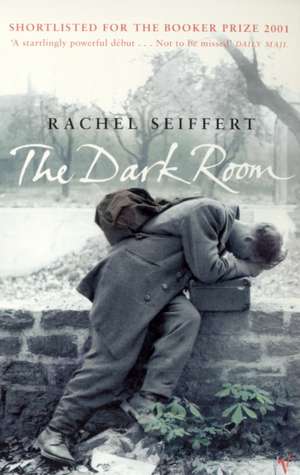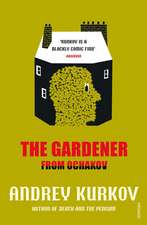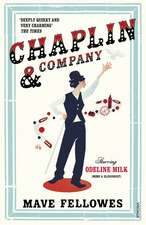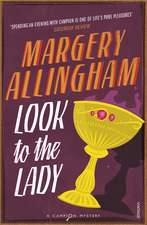The Dark Room
Autor Rachel Seifferten Limba Engleză Paperback – 7 feb 2002
| Toate formatele și edițiile | Preț | Express |
|---|---|---|
| Paperback (2) | 59.39 lei 26-32 zile | +59.18 lei 10-14 zile |
| Vintage Publishing – 7 feb 2002 | 59.39 lei 26-32 zile | +59.18 lei 10-14 zile |
| KNOPF – 8 oct 2002 | 105.89 lei 3-5 săpt. |
Preț: 59.39 lei
Preț vechi: 106.94 lei
-44% Nou
Puncte Express: 89
Preț estimativ în valută:
11.37€ • 11.82$ • 9.38£
11.37€ • 11.82$ • 9.38£
Carte disponibilă
Livrare economică 27 martie-02 aprilie
Livrare express 11-15 martie pentru 69.17 lei
Preluare comenzi: 021 569.72.76
Specificații
ISBN-13: 9780099287179
ISBN-10: 009928717X
Pagini: 400
Dimensiuni: 129 x 199 x 32 mm
Greutate: 0.28 kg
Editura: Vintage Publishing
Locul publicării:United Kingdom
ISBN-10: 009928717X
Pagini: 400
Dimensiuni: 129 x 199 x 32 mm
Greutate: 0.28 kg
Editura: Vintage Publishing
Locul publicării:United Kingdom
Notă biografică
The daughter of a German mother and an Australian father, Rachel Seiffert has spent most of her life in Oxford and Glasgow. She now lives in Berlin.
Descriere
The Dark Room tells the stories of three ordinary Germans: Helmut, a young photographer in Berlin in the 1930s who uses his craft to express his patriotic fervour; and, fifty years later, Micha, a young teacher obsessed with what his loving grandfather did in the war, struggling to deal with the past of his family and his country.
Extras
Part One
Helmut
Berlin, april 1921
Birth. His mother cuddles him and cradles him and feeds him his first meal. Happy to hold this life she has felt within her all these months. He is a little premature, but not too small, and his miniature fists grip fast to her fingers. She knows him already, and loves him. The midwife takes her husband aside when he arrives home from work. Heads him off before he reaches the bedroom door. Unlike his wife, he never gets to look at his son and feel him perfect, to love him prior to knowing his fault.
The clinic is busy, the doctor brisk but sympathetic, recommended by the midwife. The new parents are told it is a congenital condition, but not serious. Put simply, their son is missing a muscle in his chest. Provided he is given regular physical therapy, he will certainly be able to write and do all the tasks required in everyday life. He will never have full use of his right arm, of course, and manual labour will be impossible, but the absence of a pectoral muscle need not be a significant hindrance. He might even be able to play sports in time, though they are not to raise their hopes too high.
At home they watch their baby closely while he gurgles and kicks in his drawer-for-a-cot. His curved limbs and long toes, creases of new skin. He is beautiful, and the new parents smile at each other, each ready to laugh if the other will. They remove their son’s little undershirt and inspect his chest and his right armpit as he moves. He is thinner on one side than the other, it is true. But both arms pump just as vigorously when he is fed or tickled, and he is robust and lively.
Mutti cries: There’s nothing wrong. Papi puts his arms around her, still watching his son. They sit together on the bed for a long time, breathing, while the baby sleeps. And they name their tiny boy Helmut, bright nature, because that is how they see him. Perfect enough, and that is just fine.
Life between wars is harsh: food plain, luxuries scarce, living space small.
Helmut’s Papi is a veteran, and still coughs in the night and in the autumn, when the weather is damp. He is older than his wife and grateful for his chance at happiness, so he leaves the house early, every day, finds work, again and again. The flat he comes home to is always clean, with at least one of the two rooms kept warm. And since Helmut’s Mutti is a clever housewife, there is always something on the table.
Both parents are very happy with their one child, and take precautions against having more, showering their love on Helmut, who laughs much more than he cries. The mattress the three of them share is wide and warm, and though he is now talking and walking, a separate bed for Helmut seems extravagant, uncalled for, a shame. Mutti grows herbs on the windowsill, and flowers, which she lets her son tend; and if Papi is not too tired when he comes home, he will sing a bedtime song or two for the boy. The morning and evening exercises are a game Helmut plays with his parents. He is to think that all boys do this, to be strong like their fathers. That all families are as happy as this.
In the hot summers of early childhood, Helmut’s Mutti takes him on the long journey north to the coast while his father works on in the city, at whatever he can find. Helmut is brown as a nut within a week, and his hair sun-blond. He plays, naked, in the shallows with other children, and Mutti makes friends with other mothers on the beach. She never draws attention to her son’s chest, to his arm, and when the other women don’t seem to notice, Mutti chats more freely, relaxes, lies back and enjoys the company and sun.
Summer nights in hostel rooms full of whispering mothers. Bedtime stories for sleepless children, confidences and shared cigarettes by a window open to the hot dark sky.
Helmut feels his mother climb into bed, smells the fresh smoke in her hair. Closes his eyes again, falls asleep again. Thumb in his mouth, sand under his fingernails, salt beach taste on his skin.
Helmut’s father has found regular work with Herr Gladigau, who owns the photography shop at the station. Three or four days a week of assured income. Papi cleans the darkroom, changes the chemicals, and minds the shop when Herr Gladigau has appointments to attend. Gladigau likes his new employee, trusts him. He is childless, a widower, and enjoys the contact he has gained with a young and happy family. He can’t afford to pay as much as he would like, as much as Helmut’s family needs. To compensate, he offers to create a photographic record of family life. A portrait sitting every six months is the initial agreement: while the boy is young and growing quickly. Mutti is excited, Papi slightly embarrassed, but also pleased. They arrange the first session for the following week.
The print Papi chooses has Helmut standing on his father’s knee, pointing with his right hand toward Herr Gladigau’s decorative palms, which are on the left-hand side of the picture, next to his mother. Both of his parents are looking at him and smiling. A blond boy, growing out of babyhood, his right arm at full stretch, at shoulder height, perhaps just over. A normal pose for an inquisitive, active child, though unconventional for a portrait.
Gladigau favors the more sedate pictures taken earlier in the session, in which all the sitters face the camera and have their hands folded in their laps. But his employee is quietly adamant, and Gladigau can find no reason to refuse his request. He chooses a simple frame from the middle price range and wraps the portrait neatly.
The carefully patched clothes and prominent cheekbones in this and the following portraits are painful for Gladigau to see. Papi is with him almost daily, with the same face, same jacket and shoes. But in the photographs, in the darkroom, it is all too plain, sharp, clear: the cabbage-and-potato diet, the mend-and-make-do of the man’s life, his wife, his son with the crooked arm. As soon as he can, Gladigau makes Papi’s job full-time.
There is enough money now to move into a better flat. The tenements near the station are well maintained, light and clean, and Helmut, now grown out of his parents’ bed, can have a box room of his own. Their new neighbors are friendly and house-proud, and there are plenty of local children for Helmut to play with. At first he is shy, preferring to watch the trains pull in and out of the station. Long mornings spent gazing out of the kitchen window, while his mother sings behind him as she cooks and cleans. Soon, though, he takes to watching the trains from the landing, and then the back steps. Before long he has forgotten the trains and runs around the back court with the other children, playing riotous, overlapping games of hide-and-chase and catch.
Mutti looks for her son in the flat, on the landing, out on the back steps, sees him running. She spends an afternoon at the kitchen window, watching him play. Mutti can see how her son’s right arm lags behind him as he runs. How his right shoulder hangs lower, and the way he introduces a small skip into his gait every so often, to help his right side catch up with the rest of his slight frame. She can also see that Helmut is unaware of this. Shifting her attention to the other children, she sees little feet that limp without shoes as they run over the rough ground. Pale complexions and eyes ringed dark with hunger, bitten nails and straggly pigtails. Of course, shoes can be bought, and so can food. Certainly bad habits can be dropped and hair can be brushed. Helmut cannot be cured by prosperity, by nourishment, or by discipline. But none of the neighborhood children mock him, or even stare. And though she never gives up the habit of watching, checking, Helmut’s Mutti does allow herself to feel relieved.
With school, though, there comes a change. The sports teacher
orders a full inspection of his new charges. Shirts off, they stand to attention in order of height. Those deemed in need of special treatment are pulled out of line and assembled in a raggedy bunch in the corner of the schoolyard. Helmut finds himself among the fat boys and the weak boys with bad teeth, and doesn’t know why. Once it is established, in front of the silent eyes of his class, that unlike the others he cannot raise his right arm above his shoulder, Helmut knows there is something wrong with him.
At home Mutti cries, and later Papi rages. He goes to the school with Helmut the next day and demands that his son be allowed to take sports with the healthy boys. He has never had problems out in the back court with the neighborhood children, or on the beach in summer.
Papi is asked to wait in the wide lobby. There is no chair, so he stands near the door, on the edge of the parquet with its high wax shine. A class ends, another begins, and Papi is now very late for work. In the silence he remembers Helmut’s birth. The clinic they took him to, with the same corridors; same wide, swinging doors; same stifled, shameful feeling about his son. He resents the midwife, the doctor she sent them to. Blames them for coming between him and his child. Resents the headmaster, too, though he does not argue when he is finally sent word. The school will not reverse the decision. Helmut will take gymnastics to supplement his daily physical therapy, but no team games unless his condition improves. Papi reads the note, picks up his hat and coat, and leaves.
At home that evening, Helmut’s father takes him on his knee. He is a strong little man, loved by his Mutti and Papi, and he will work hard to prove himself to the school. They will do it together, all three of them. The strength of the family will prevail.
But Helmut is still with the fat boys and the weak boys with bad teeth, and he still can’t catch a ball thrown over shoulder height. At home, the twice-daily exercises become more vigorous, less fun,
especially when performed with his father. In the toilet down the corridor, he scrutinizes the thin twist of muscle below his right collarbone. In the wide, sleek bakery window, he sees how his right arm hangs: low and crooked, crowding his narrow chest.
Helmut still plays in the back court with the neighborhood children, but Mutti also frequently catches sight of him standing at the high fence at the far end of the tenements, staring through the slats at the trains pulling in and out. It is not a large station, but most days there are two or three passenger trains arriving from other cities, going to places far away. Dresden, Leipzig, Stuttgart, Munich.
Helmut does not concern himself with engine numbers or types of carriage. He likes times and destinations, arrivals and departures. He likes to watch the people, in groups and alone, with trolley-loads of baggage, or carrying nothing. By their other-city walks and clothes, he can tell if someone hasn’t been to Berlin before.
Helmut is not always alone by the high fence. His encyclopedic knowledge of the timetable impresses many of the other little boys. He also makes friends with the guards, quizzing them on arrivals and distances through the turnstile bars. Soon he is allowed onto the platform, where he collects the punched tickets from the passengers as they disembark. Those who notice his arm and his patched clothes sometimes slip a groschen into his hand. Helmut is faintly embarrassed by these gestures: certain his parents would disapprove, uncertain as to why. But he never refuses the strangers’ gifts: the ability to buy sweets is a powerful weapon in the war for friends. He uses his access to the railway station and his small bags of licorice well. As favors bestowed, not pleas for acceptance. The neighborhood children often come calling, clatter down the stairs behind him, across the back court to the tracks.
The family photos show a healthy boy, already quite tall, standing between his parents, both seated slightly in front of him. He has a sailor suit on, the regular uniform for boys on Sundays and holidays. His right arm rests on his mother’s shoulder, and he is standing so that his left side favors the camera slightly. The combined effect is to minimize his lopsided chest, to mask the crooked hang of his arm. For three or four years, the family adopts a similar pose, variations coming in the clothes, Helmut’s height, and the gradual graying of his father’s beard. The family looks content, healthier, cheeks plumper than in previous years. For all the artful masking of a son’s disability, they are relaxed. Still proud, still a unit, gradually growing into a kind of prosperity.
Puberty and the Third Reich arrive simultaneously. To Helmut’s shame, not only does he grow hair on his body, but the fluff that should be under his right arm grows higher, more visible, under his collarbone. The strange sinew-twist below the skin on his chest becomes more pronounced as his muscles become more defined.
All boys do gymnastics now at school, but that only makes Helmut’s restricted arm movement more conspicuous. He wears a long-sleeved jersey, not an undershirt like the rest. Some stare at him as they change, still others push into him as they pass in the long school corridors. Most of the time, it is not discussed.
Helmut is good at his studies and has a few friends at school. At home, he still spends most afternoons at the station, usually alone. Some evenings he finds the neighborhood boys in the back court
on his way home. Helmut stands with them a while as they wrestle and joke, and they ask him about the trains but only half listen to his replies. They have joined clubs to which Helmut is not invited, have grown more interested in the gangs and street fights, and licorice isn’t the draw it once was. Occasionally one of the neighbors’ girls will join him on the platform. Edda Biene, waiting by the mail sacks, sucking her long plaits, watching Helmut greet the disembarking passengers, gathering his tickets. The hang of Helmut’s arm has become more pronounced with puberty, and increased prosperity has made the passengers more generous. Helmut knows if he saves for a few days, and takes Edda for an ice cream in the shop next to Gladigau’s, then she might let him hold her hand, or even show him her legs in the stairwell on the way home.
He knows he is fit, feels he has a strong heart and good lungs and swift legs to offer his nation. He also knows he is imperfect.
Helmut has left school now. Other boys go to work, learn trades, but Mutti persuades Papi to let their son stay at home. Just for a while, he’s not ready yet, still just a boy. Helmut’s Papi sighs and agrees.
Mutti takes in washing now, and Helmut does a share of the folding and carrying, but for a year or so, his days are largely spent drifting between station and home. Quiet and content, his head full of timetables. Eating the warm lunches Mutti cooks for him, gazing across the kitchen table to the window with his daydreamer’s faraway eyes.
Papi is irritated by his son’s idle behaviour. At Gladigau’s, business is good. He has new cameras, better film stock, and needs an extra pair of hands. Papi knows this, takes his son aside, suggests he make himself useful. Helmut is eager to please his father, and come the autumn he seizes his chance. Out before breakfast to greet the first train, Helmut finds the pavement glittering with a thick frost of glass. The early crowd pick their way carefully through the shards to the station gates, past Gladigau, whose windows are unharmed, but who stands and stares, pale in the November light. Helmut takes his keys, finds a broom, and sweeps without saying a word, and Gladigau appreciates this. The boy is now the obvious choice.
Papi persuades this time, and Mutti relents. He can work Monday, Wednesday, and Friday afternoons, and also Saturdays, if there are errands to be run. Employer, father, and son work alongside one another: quiet, busy, efficient. Gladigau likes the boy and treats him well, teaching him, nurturing him, though never indulging him.
Helmut likes the darkroom. The soothing sound of the gently running tap, and the alkaline smell of the chemicals. He has the light on only when he is cleaning, likes to mix and load in the red of the safelight or the deep, rich dark. The portraits taken with the big studio camera are Gladigau’s forte, and neither Papi nor Helmut are allowed to touch the sheets once they have been exposed. However, Gladigau also experiments with the new cameras and their long spools of film, and because Helmut is thorough and methodical in his work, he is allowed to process these negatives. He winds the long rolls off patiently, fingers working skillfully without the aid of eyes. He times the baths well, after discussing the exposures with Gladigau, and the old man is pleased and proud of his apprentice’s understanding of the work. Although his employer always makes the prints himself, he does allow Helmut to do experiments of his own with leftover chemicals and discarded negatives. On slow afternoons, when the darkroom is free, Helmut teaches himself to print on scraps of thick photographic paper, which he seeks out of the darkroom shelves and drawers.
In the cupboard in the small back toilet, under the bottles of developer and fixer, Helmut uncovers the American magazines that Gladigau has kept neatly folded in brown paper. The bolt has a screw missing, so Helmut sits with his boot wedged tight against the door. Black-and-white photos of women, draped in veils, in half-light. Helmut does not understand English, but he does understand the references to films, to f-stops, cameras, and lenses. German film and German cameras are the best, he knows, but these American women are very good, too. Rounded stomachs, small breasts, long, wide thighs. Some of the photos have been taken outside, and the women are swimming, their bodies rippling water and light.
When he is not working, Helmut daydreams about his job. The subdued lighting, the running water, his rigid right leg. The white skin of the American women and the loose bolt on the toilet door. At night he conjures the images against his bedroom ceiling as the long, slow freight trains clatter below, a soothing rhythm of sleep.
To the east, new land is found; old land is found again. So many things are better now: brighter, healthier, cleaner. Helmut sees it in his parents’ faces, knows it is enshrined in law. He feels it in his legs as he strides to the station; the freshness of spring and promise of summer tell him: larger, wider, stronger.
He could be called and carried by it, and perhaps even cured.
At eighteen, Helmut goes with three of the neighbors’ boys to the draft board. All of their faces tight, and eyes bright with the adventure that lies ahead. Despite his flushed cheeks, Helmut has a cloud in his belly which he cannot shift. The doctor is not unkind, and Helmut is glad of the private room, the two minutes’ grace he is given to blink back his boy’s tears. The other boys slap him hard on the back, tell him he’ll be in with them next time round. Perfect officer material. They don’t ask him to come and share a schnapps.
He walks home, fast and by the back routes. Imagines each man he sees is on his way to the front, while he is going home to his mother. Helmut locks himself in his box room, stares out of the window, up at the sky over Berlin. He musn’t cry; that would be further humiliation. He knows Mutti is sitting tight and still in the next room, listening, guessing. His fists are balled tight in his blankets, and the windowpane swims shapes before his eyes.
His father is silent for a long time. Helmut listens at the door and hears no sound from either of his parents, hands growing clammy in the dark. When Papi finally speaks, it is a relief. No more wasting time at the station, in daydreams. He is not a child now, not a girl, he needs to start earning his place in the world. Helmut’s father stopped exercising with his son a couple of years ago, and now he tells his wife to stop, too. The ritual has become embarrassing to mother and son. Too physical and too pointless. Mutti feels the loss of daily proximity, but repeats to herself that it is for the best, until she believes it.
Helmut’s parents join the Party; the Führer joins the family portraits on the wall above the sofa. In the first days of war, Helmut’s father finds a well-paying job managing the floor of a new factory on the outskirts of Berlin. Helmut gets a full-time job with Gladigau.
The last family portrait is taken. Helmut is now an adult, after all. Gladigau jokes with Mutti as he sets up the camera. The next pictures will be of a wedding, and the christenings which will follow. Mutti flushes, Papi says nothing, Helmut busies himself with shutting up the shop and closes his ears. The moment passes.
For this last photo, both men stand, father and son, and their wife and mother sits proudly in front of them. Both have one hand on each of her shoulders, and Helmut has his left arm around his father’s back. The encircling warmth of the family.
Since this is their final sitting, Gladigau also takes an individual portrait of Helmut. Captured from the chest up, left shoulder angled toward the camera, his gaze directed up and right of frame by Gladigau’s outstretched finger. Helmut has the trace of a smile around his slim lips, and the downward tilt of his chin makes him look shy, girlish. Though his hair is dark now and combed down with water and some of his father’s pomade, it still has a boy’s curl about it.
Gladigau is pleased with this individual portrait. He props it up against the till as he takes his evening schnapps. Examines the heavy brows, and the pale eyes set deep in their sockets; remembers the boy with the sharp cheekbones and brittle-looking wrists; approves of the calm young man he sees in front of him now. Gladigau selects a plain frame, but one from the top price range, and wraps Helmut’s likeness for his mother to collect.
Mutti sits on the bed and holds the photo on her lap. Stays still like that for half the afternoon, heart beating unexpectedly fast. She covers her son’s right eye and looks only at the left, the eye nearest the camera, and finds the root of her uncertainty there. She thinks it might be the muscles of the lower eyelid, tightening slightly at the moment of exposure. Or perhaps just a trick of the light: the two sharp, white pinpoints in the eye, creating the illusion of pain. Closer inspection of the family picture reveals no such information, so it could simply be that her son, a shy young man, was nervous sitting by himself, for his employer. It was an extravagant gift, after all, and unexpected. And the frame.
The picture is not displayed in the living room, where visitors might see it. His mother keeps it on her bedside table, and later lays it carefully away in a drawer...
Helmut
Berlin, april 1921
Birth. His mother cuddles him and cradles him and feeds him his first meal. Happy to hold this life she has felt within her all these months. He is a little premature, but not too small, and his miniature fists grip fast to her fingers. She knows him already, and loves him. The midwife takes her husband aside when he arrives home from work. Heads him off before he reaches the bedroom door. Unlike his wife, he never gets to look at his son and feel him perfect, to love him prior to knowing his fault.
The clinic is busy, the doctor brisk but sympathetic, recommended by the midwife. The new parents are told it is a congenital condition, but not serious. Put simply, their son is missing a muscle in his chest. Provided he is given regular physical therapy, he will certainly be able to write and do all the tasks required in everyday life. He will never have full use of his right arm, of course, and manual labour will be impossible, but the absence of a pectoral muscle need not be a significant hindrance. He might even be able to play sports in time, though they are not to raise their hopes too high.
At home they watch their baby closely while he gurgles and kicks in his drawer-for-a-cot. His curved limbs and long toes, creases of new skin. He is beautiful, and the new parents smile at each other, each ready to laugh if the other will. They remove their son’s little undershirt and inspect his chest and his right armpit as he moves. He is thinner on one side than the other, it is true. But both arms pump just as vigorously when he is fed or tickled, and he is robust and lively.
Mutti cries: There’s nothing wrong. Papi puts his arms around her, still watching his son. They sit together on the bed for a long time, breathing, while the baby sleeps. And they name their tiny boy Helmut, bright nature, because that is how they see him. Perfect enough, and that is just fine.
Life between wars is harsh: food plain, luxuries scarce, living space small.
Helmut’s Papi is a veteran, and still coughs in the night and in the autumn, when the weather is damp. He is older than his wife and grateful for his chance at happiness, so he leaves the house early, every day, finds work, again and again. The flat he comes home to is always clean, with at least one of the two rooms kept warm. And since Helmut’s Mutti is a clever housewife, there is always something on the table.
Both parents are very happy with their one child, and take precautions against having more, showering their love on Helmut, who laughs much more than he cries. The mattress the three of them share is wide and warm, and though he is now talking and walking, a separate bed for Helmut seems extravagant, uncalled for, a shame. Mutti grows herbs on the windowsill, and flowers, which she lets her son tend; and if Papi is not too tired when he comes home, he will sing a bedtime song or two for the boy. The morning and evening exercises are a game Helmut plays with his parents. He is to think that all boys do this, to be strong like their fathers. That all families are as happy as this.
In the hot summers of early childhood, Helmut’s Mutti takes him on the long journey north to the coast while his father works on in the city, at whatever he can find. Helmut is brown as a nut within a week, and his hair sun-blond. He plays, naked, in the shallows with other children, and Mutti makes friends with other mothers on the beach. She never draws attention to her son’s chest, to his arm, and when the other women don’t seem to notice, Mutti chats more freely, relaxes, lies back and enjoys the company and sun.
Summer nights in hostel rooms full of whispering mothers. Bedtime stories for sleepless children, confidences and shared cigarettes by a window open to the hot dark sky.
Helmut feels his mother climb into bed, smells the fresh smoke in her hair. Closes his eyes again, falls asleep again. Thumb in his mouth, sand under his fingernails, salt beach taste on his skin.
Helmut’s father has found regular work with Herr Gladigau, who owns the photography shop at the station. Three or four days a week of assured income. Papi cleans the darkroom, changes the chemicals, and minds the shop when Herr Gladigau has appointments to attend. Gladigau likes his new employee, trusts him. He is childless, a widower, and enjoys the contact he has gained with a young and happy family. He can’t afford to pay as much as he would like, as much as Helmut’s family needs. To compensate, he offers to create a photographic record of family life. A portrait sitting every six months is the initial agreement: while the boy is young and growing quickly. Mutti is excited, Papi slightly embarrassed, but also pleased. They arrange the first session for the following week.
The print Papi chooses has Helmut standing on his father’s knee, pointing with his right hand toward Herr Gladigau’s decorative palms, which are on the left-hand side of the picture, next to his mother. Both of his parents are looking at him and smiling. A blond boy, growing out of babyhood, his right arm at full stretch, at shoulder height, perhaps just over. A normal pose for an inquisitive, active child, though unconventional for a portrait.
Gladigau favors the more sedate pictures taken earlier in the session, in which all the sitters face the camera and have their hands folded in their laps. But his employee is quietly adamant, and Gladigau can find no reason to refuse his request. He chooses a simple frame from the middle price range and wraps the portrait neatly.
The carefully patched clothes and prominent cheekbones in this and the following portraits are painful for Gladigau to see. Papi is with him almost daily, with the same face, same jacket and shoes. But in the photographs, in the darkroom, it is all too plain, sharp, clear: the cabbage-and-potato diet, the mend-and-make-do of the man’s life, his wife, his son with the crooked arm. As soon as he can, Gladigau makes Papi’s job full-time.
There is enough money now to move into a better flat. The tenements near the station are well maintained, light and clean, and Helmut, now grown out of his parents’ bed, can have a box room of his own. Their new neighbors are friendly and house-proud, and there are plenty of local children for Helmut to play with. At first he is shy, preferring to watch the trains pull in and out of the station. Long mornings spent gazing out of the kitchen window, while his mother sings behind him as she cooks and cleans. Soon, though, he takes to watching the trains from the landing, and then the back steps. Before long he has forgotten the trains and runs around the back court with the other children, playing riotous, overlapping games of hide-and-chase and catch.
Mutti looks for her son in the flat, on the landing, out on the back steps, sees him running. She spends an afternoon at the kitchen window, watching him play. Mutti can see how her son’s right arm lags behind him as he runs. How his right shoulder hangs lower, and the way he introduces a small skip into his gait every so often, to help his right side catch up with the rest of his slight frame. She can also see that Helmut is unaware of this. Shifting her attention to the other children, she sees little feet that limp without shoes as they run over the rough ground. Pale complexions and eyes ringed dark with hunger, bitten nails and straggly pigtails. Of course, shoes can be bought, and so can food. Certainly bad habits can be dropped and hair can be brushed. Helmut cannot be cured by prosperity, by nourishment, or by discipline. But none of the neighborhood children mock him, or even stare. And though she never gives up the habit of watching, checking, Helmut’s Mutti does allow herself to feel relieved.
With school, though, there comes a change. The sports teacher
orders a full inspection of his new charges. Shirts off, they stand to attention in order of height. Those deemed in need of special treatment are pulled out of line and assembled in a raggedy bunch in the corner of the schoolyard. Helmut finds himself among the fat boys and the weak boys with bad teeth, and doesn’t know why. Once it is established, in front of the silent eyes of his class, that unlike the others he cannot raise his right arm above his shoulder, Helmut knows there is something wrong with him.
At home Mutti cries, and later Papi rages. He goes to the school with Helmut the next day and demands that his son be allowed to take sports with the healthy boys. He has never had problems out in the back court with the neighborhood children, or on the beach in summer.
Papi is asked to wait in the wide lobby. There is no chair, so he stands near the door, on the edge of the parquet with its high wax shine. A class ends, another begins, and Papi is now very late for work. In the silence he remembers Helmut’s birth. The clinic they took him to, with the same corridors; same wide, swinging doors; same stifled, shameful feeling about his son. He resents the midwife, the doctor she sent them to. Blames them for coming between him and his child. Resents the headmaster, too, though he does not argue when he is finally sent word. The school will not reverse the decision. Helmut will take gymnastics to supplement his daily physical therapy, but no team games unless his condition improves. Papi reads the note, picks up his hat and coat, and leaves.
At home that evening, Helmut’s father takes him on his knee. He is a strong little man, loved by his Mutti and Papi, and he will work hard to prove himself to the school. They will do it together, all three of them. The strength of the family will prevail.
But Helmut is still with the fat boys and the weak boys with bad teeth, and he still can’t catch a ball thrown over shoulder height. At home, the twice-daily exercises become more vigorous, less fun,
especially when performed with his father. In the toilet down the corridor, he scrutinizes the thin twist of muscle below his right collarbone. In the wide, sleek bakery window, he sees how his right arm hangs: low and crooked, crowding his narrow chest.
Helmut still plays in the back court with the neighborhood children, but Mutti also frequently catches sight of him standing at the high fence at the far end of the tenements, staring through the slats at the trains pulling in and out. It is not a large station, but most days there are two or three passenger trains arriving from other cities, going to places far away. Dresden, Leipzig, Stuttgart, Munich.
Helmut does not concern himself with engine numbers or types of carriage. He likes times and destinations, arrivals and departures. He likes to watch the people, in groups and alone, with trolley-loads of baggage, or carrying nothing. By their other-city walks and clothes, he can tell if someone hasn’t been to Berlin before.
Helmut is not always alone by the high fence. His encyclopedic knowledge of the timetable impresses many of the other little boys. He also makes friends with the guards, quizzing them on arrivals and distances through the turnstile bars. Soon he is allowed onto the platform, where he collects the punched tickets from the passengers as they disembark. Those who notice his arm and his patched clothes sometimes slip a groschen into his hand. Helmut is faintly embarrassed by these gestures: certain his parents would disapprove, uncertain as to why. But he never refuses the strangers’ gifts: the ability to buy sweets is a powerful weapon in the war for friends. He uses his access to the railway station and his small bags of licorice well. As favors bestowed, not pleas for acceptance. The neighborhood children often come calling, clatter down the stairs behind him, across the back court to the tracks.
The family photos show a healthy boy, already quite tall, standing between his parents, both seated slightly in front of him. He has a sailor suit on, the regular uniform for boys on Sundays and holidays. His right arm rests on his mother’s shoulder, and he is standing so that his left side favors the camera slightly. The combined effect is to minimize his lopsided chest, to mask the crooked hang of his arm. For three or four years, the family adopts a similar pose, variations coming in the clothes, Helmut’s height, and the gradual graying of his father’s beard. The family looks content, healthier, cheeks plumper than in previous years. For all the artful masking of a son’s disability, they are relaxed. Still proud, still a unit, gradually growing into a kind of prosperity.
Puberty and the Third Reich arrive simultaneously. To Helmut’s shame, not only does he grow hair on his body, but the fluff that should be under his right arm grows higher, more visible, under his collarbone. The strange sinew-twist below the skin on his chest becomes more pronounced as his muscles become more defined.
All boys do gymnastics now at school, but that only makes Helmut’s restricted arm movement more conspicuous. He wears a long-sleeved jersey, not an undershirt like the rest. Some stare at him as they change, still others push into him as they pass in the long school corridors. Most of the time, it is not discussed.
Helmut is good at his studies and has a few friends at school. At home, he still spends most afternoons at the station, usually alone. Some evenings he finds the neighborhood boys in the back court
on his way home. Helmut stands with them a while as they wrestle and joke, and they ask him about the trains but only half listen to his replies. They have joined clubs to which Helmut is not invited, have grown more interested in the gangs and street fights, and licorice isn’t the draw it once was. Occasionally one of the neighbors’ girls will join him on the platform. Edda Biene, waiting by the mail sacks, sucking her long plaits, watching Helmut greet the disembarking passengers, gathering his tickets. The hang of Helmut’s arm has become more pronounced with puberty, and increased prosperity has made the passengers more generous. Helmut knows if he saves for a few days, and takes Edda for an ice cream in the shop next to Gladigau’s, then she might let him hold her hand, or even show him her legs in the stairwell on the way home.
He knows he is fit, feels he has a strong heart and good lungs and swift legs to offer his nation. He also knows he is imperfect.
Helmut has left school now. Other boys go to work, learn trades, but Mutti persuades Papi to let their son stay at home. Just for a while, he’s not ready yet, still just a boy. Helmut’s Papi sighs and agrees.
Mutti takes in washing now, and Helmut does a share of the folding and carrying, but for a year or so, his days are largely spent drifting between station and home. Quiet and content, his head full of timetables. Eating the warm lunches Mutti cooks for him, gazing across the kitchen table to the window with his daydreamer’s faraway eyes.
Papi is irritated by his son’s idle behaviour. At Gladigau’s, business is good. He has new cameras, better film stock, and needs an extra pair of hands. Papi knows this, takes his son aside, suggests he make himself useful. Helmut is eager to please his father, and come the autumn he seizes his chance. Out before breakfast to greet the first train, Helmut finds the pavement glittering with a thick frost of glass. The early crowd pick their way carefully through the shards to the station gates, past Gladigau, whose windows are unharmed, but who stands and stares, pale in the November light. Helmut takes his keys, finds a broom, and sweeps without saying a word, and Gladigau appreciates this. The boy is now the obvious choice.
Papi persuades this time, and Mutti relents. He can work Monday, Wednesday, and Friday afternoons, and also Saturdays, if there are errands to be run. Employer, father, and son work alongside one another: quiet, busy, efficient. Gladigau likes the boy and treats him well, teaching him, nurturing him, though never indulging him.
Helmut likes the darkroom. The soothing sound of the gently running tap, and the alkaline smell of the chemicals. He has the light on only when he is cleaning, likes to mix and load in the red of the safelight or the deep, rich dark. The portraits taken with the big studio camera are Gladigau’s forte, and neither Papi nor Helmut are allowed to touch the sheets once they have been exposed. However, Gladigau also experiments with the new cameras and their long spools of film, and because Helmut is thorough and methodical in his work, he is allowed to process these negatives. He winds the long rolls off patiently, fingers working skillfully without the aid of eyes. He times the baths well, after discussing the exposures with Gladigau, and the old man is pleased and proud of his apprentice’s understanding of the work. Although his employer always makes the prints himself, he does allow Helmut to do experiments of his own with leftover chemicals and discarded negatives. On slow afternoons, when the darkroom is free, Helmut teaches himself to print on scraps of thick photographic paper, which he seeks out of the darkroom shelves and drawers.
In the cupboard in the small back toilet, under the bottles of developer and fixer, Helmut uncovers the American magazines that Gladigau has kept neatly folded in brown paper. The bolt has a screw missing, so Helmut sits with his boot wedged tight against the door. Black-and-white photos of women, draped in veils, in half-light. Helmut does not understand English, but he does understand the references to films, to f-stops, cameras, and lenses. German film and German cameras are the best, he knows, but these American women are very good, too. Rounded stomachs, small breasts, long, wide thighs. Some of the photos have been taken outside, and the women are swimming, their bodies rippling water and light.
When he is not working, Helmut daydreams about his job. The subdued lighting, the running water, his rigid right leg. The white skin of the American women and the loose bolt on the toilet door. At night he conjures the images against his bedroom ceiling as the long, slow freight trains clatter below, a soothing rhythm of sleep.
To the east, new land is found; old land is found again. So many things are better now: brighter, healthier, cleaner. Helmut sees it in his parents’ faces, knows it is enshrined in law. He feels it in his legs as he strides to the station; the freshness of spring and promise of summer tell him: larger, wider, stronger.
He could be called and carried by it, and perhaps even cured.
At eighteen, Helmut goes with three of the neighbors’ boys to the draft board. All of their faces tight, and eyes bright with the adventure that lies ahead. Despite his flushed cheeks, Helmut has a cloud in his belly which he cannot shift. The doctor is not unkind, and Helmut is glad of the private room, the two minutes’ grace he is given to blink back his boy’s tears. The other boys slap him hard on the back, tell him he’ll be in with them next time round. Perfect officer material. They don’t ask him to come and share a schnapps.
He walks home, fast and by the back routes. Imagines each man he sees is on his way to the front, while he is going home to his mother. Helmut locks himself in his box room, stares out of the window, up at the sky over Berlin. He musn’t cry; that would be further humiliation. He knows Mutti is sitting tight and still in the next room, listening, guessing. His fists are balled tight in his blankets, and the windowpane swims shapes before his eyes.
His father is silent for a long time. Helmut listens at the door and hears no sound from either of his parents, hands growing clammy in the dark. When Papi finally speaks, it is a relief. No more wasting time at the station, in daydreams. He is not a child now, not a girl, he needs to start earning his place in the world. Helmut’s father stopped exercising with his son a couple of years ago, and now he tells his wife to stop, too. The ritual has become embarrassing to mother and son. Too physical and too pointless. Mutti feels the loss of daily proximity, but repeats to herself that it is for the best, until she believes it.
Helmut’s parents join the Party; the Führer joins the family portraits on the wall above the sofa. In the first days of war, Helmut’s father finds a well-paying job managing the floor of a new factory on the outskirts of Berlin. Helmut gets a full-time job with Gladigau.
The last family portrait is taken. Helmut is now an adult, after all. Gladigau jokes with Mutti as he sets up the camera. The next pictures will be of a wedding, and the christenings which will follow. Mutti flushes, Papi says nothing, Helmut busies himself with shutting up the shop and closes his ears. The moment passes.
For this last photo, both men stand, father and son, and their wife and mother sits proudly in front of them. Both have one hand on each of her shoulders, and Helmut has his left arm around his father’s back. The encircling warmth of the family.
Since this is their final sitting, Gladigau also takes an individual portrait of Helmut. Captured from the chest up, left shoulder angled toward the camera, his gaze directed up and right of frame by Gladigau’s outstretched finger. Helmut has the trace of a smile around his slim lips, and the downward tilt of his chin makes him look shy, girlish. Though his hair is dark now and combed down with water and some of his father’s pomade, it still has a boy’s curl about it.
Gladigau is pleased with this individual portrait. He props it up against the till as he takes his evening schnapps. Examines the heavy brows, and the pale eyes set deep in their sockets; remembers the boy with the sharp cheekbones and brittle-looking wrists; approves of the calm young man he sees in front of him now. Gladigau selects a plain frame, but one from the top price range, and wraps Helmut’s likeness for his mother to collect.
Mutti sits on the bed and holds the photo on her lap. Stays still like that for half the afternoon, heart beating unexpectedly fast. She covers her son’s right eye and looks only at the left, the eye nearest the camera, and finds the root of her uncertainty there. She thinks it might be the muscles of the lower eyelid, tightening slightly at the moment of exposure. Or perhaps just a trick of the light: the two sharp, white pinpoints in the eye, creating the illusion of pain. Closer inspection of the family picture reveals no such information, so it could simply be that her son, a shy young man, was nervous sitting by himself, for his employer. It was an extravagant gift, after all, and unexpected. And the frame.
The picture is not displayed in the living room, where visitors might see it. His mother keeps it on her bedside table, and later lays it carefully away in a drawer...
Recenzii
“A novel about the German soul in the twentieth century, this debut work stuns with its simplicity of style and hugeness of subject.” –The Philadelphia Inquirer
“Ambitious and powerful. . . . Seiffert writes lean, clean prose. Deftly, she hangs large ideas on the vivid private experiences of her principal characters [to] form an allegory of the German soul in its passage over eighty years.” —The New York Times Book Review
“[A] probing novel. . . . Seiffert gives us pictures as evocative as they are ghostly....” —Los Angeles Times Book Review
“Lyrical . . . explores the experience of ‘ordinary’ Germans–the descendents of Nazis and Nazi sympathizers–and poses questions about the country’s psychological and political inheritance with rare insight and humanity.” --The New Yorker
“Ambitious and powerful. . . . Seiffert writes lean, clean prose. Deftly, she hangs large ideas on the vivid private experiences of her principal characters [to] form an allegory of the German soul in its passage over eighty years.” —The New York Times Book Review
“[A] probing novel. . . . Seiffert gives us pictures as evocative as they are ghostly....” —Los Angeles Times Book Review
“Lyrical . . . explores the experience of ‘ordinary’ Germans–the descendents of Nazis and Nazi sympathizers–and poses questions about the country’s psychological and political inheritance with rare insight and humanity.” --The New Yorker

























